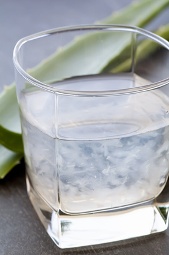Aloe Vera Drink for Improved Health
An aloe vera drink provides plenty of health benefits. But what’s best – a drink made from homemade aloe vera juice or a commercial, processed aloe vera juice drink?
Eating aloe vera
gel in it's fresh form is the best way to enjoy maximum health benefits of this amazing plant.
If you cannot get hold of fresh aloe leaves then adding bought aloe vera juice drinks to your homemade
healthy fruit smoothie recipes
is an alternative way to go.
However, it’s important that you look for a quality product that is certified by the International Aloe Science Council www.iasc.org
or a similar professional body. The production and distribution of aloe vera juice drinks and other related products often by-passes regulation as they are considered natural health products rather than drugs. Believe it or not, despite the many health claims they make, manufacturers are not required to test their products for safety or effectiveness.

The quality of an aloe vera drink depends on both the type or amount of gel used and the processing methods used in its production.
Many commercial aloe drinks are not 100% natural, nor do they contain enough aloe vera gel to offer effective
aloe vera juice benefits.
Not only that, but samples of many drinks have been found to be highly inconsistent and according to Cancer Research UK (2009) may not even contain the amount of aloe vera as stated on the label.
So what should you look for in any aloe vera drink products?
Determine whether you are buying a juice or a gel? Aloe vera gel usually refers to the extracted inner-leaf gel in as natural, undiluted form as possible. A juice on the other hand is generally aloe vera in a thinner, more diluted form.
Avoid juice drinks where the aloe vera has undergone harsh manufacturing processes at extreme temperatures, such as freeze-drying or boiling, which are likely to destroy many of the beneficial nutrients. Look instead for "cold-pressed" aloe vera, where the nutritional composition is maintained.
Avoid whole leaf aloe vera juices. The outer skin of the leaf is in itself highly toxic and can cause severe stomach cramps. When the outer leaf is included the resulting gel is then filtered to remove it, which causes loss of nutrients too.
Check the ingredients carefully. Aloe vera should be at the top of the list of ingredients, which might also consist of added sugar, water, flavoring and preservative. Unless you are buying aloe vera juice directly from a plantation, or from a refrigerator in a store, all aloe vera juice drinks will of necessity contain a stabilizer to prolong the shelf-life. You may wish to avoid artificial preservatives such as potassium benzoate or ascorbic acid and look for use of a natural citric acid instead.
Compare the list of ingredients with the front label. Made with "100% Pure Aloe Vera" probably indicates pure aloe vera has been mixed with water and other ingredients to manufacture the drink. Flavored aloe vera juice drinks are very popular, from simple orange or lime to exotic mango or cranberry flavors. For the most effective health benefits, select an aloe vera drink with the least added water content and closest to the natural gel form as possible.
Return from Aloe Vera Drink to the Soup and Smoothie Diet Homepage
|
